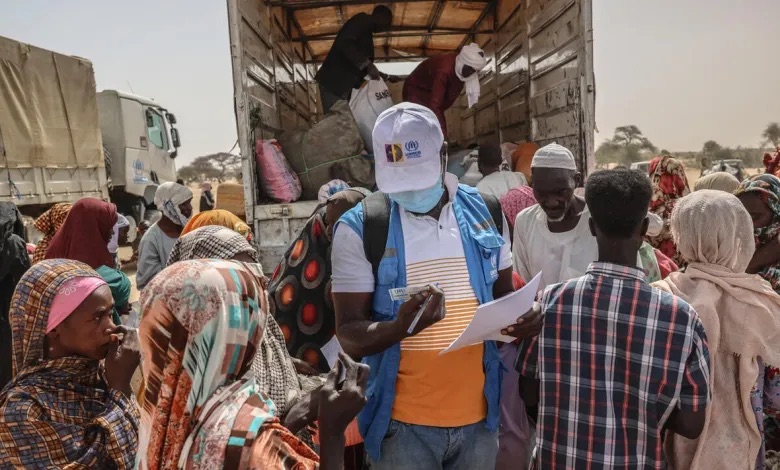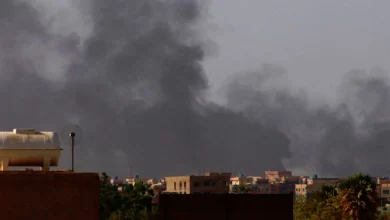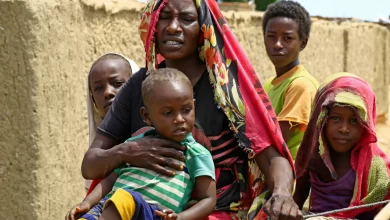UNHCR: The Sudanese crisis has reached the point of no return

The United Nations High Commissioner for Refugees (UNHCR) is raising the alarm in regards to the deepening humanitarian emergency in eastern Chad, where the number of Sudanese refugees arriving in the country has more than tripled in just over two years of deadly conflict.
Since (April 2023), more than (844,000 Sudanese refugees) have crossed into Chad. Prior to the most recent crisis, Chad hosted approximately (409,000 Sudanese refugees) fleeing previous waves of conflict in Darfur between (2003 and 2023).
Over the past two years, the country has seen this refugee population surge to over (1.2 million) people, far exceeding the number received during the previous two decades and placing unsustainable strain on Chad’s response capacity.
The most recent influx to Chad began in late April 2025, following violent attacks in North Darfur earlier that month. The clashes claimed the lives of more than (300 civilians) and forced tens of thousands to seek safety.
In just over a month, (68,556 refugees) have arrived in Chad’s Wadi Fira and EnnediEst provinces, with an average of (1,400 people) crossing the border daily in recent days. These civilians are fleeing in terror, many under fire, navigating armed checkpoints, extortion, and tight restrictions imposed by armed groups.
UNHCR protection teams have interviewed (6,810) newly-arrived refugees since late April, uncovering harrowing accounts of violence and loss. A staggering (72%) reported serious human rights violations, including physical and sexual violence, arbitrary detention, and forced recruitment; (60%) explained that they had been separated from family members.
Alongside the displacement emergency, a massive crisis is unfolding affecting children.
The percentage of school-age children currently out of school has reached (66%), and (30 children) have arrived with serious injuries.
Amongst those affected is Hawa, a seven-year-old girl who fled to Chad with her older sister after losing their mother, father and two brothers. During the attack, Hawa sustained severe injuries and one of her legs had to be amputated. Her story is just one amongst countless others that reflect the devastating physical and psychological toll of the ongoing war on civilians in Sudan. There is an urgent need to expand health-care provision and mental health support in order to address immediate suffering and lay the groundwork for recovery and reconciliation.
Despite the efforts of humanitarian partners and local authorities, the emergency response remains dangerously underfunded. Shelter conditions are equally dire. Only (14%) of current needs are being met, leaving tens of thousands exposed to extreme weather and insecurity. Refugees currently receive only (5 litres) of water per person per day, well below the international standard of (15 to 20 litres) for basic daily needs. This severe shortage forces families to make impossible choices that put their health and dignity at risk. Additionally, around (290,000 refugees) remain stranded at the border, exposed to the elements, insecurity and the risk of further violence.
UNHCR also emphasizes the urgent need for the global community to acknowledge and act, in an effort to eradicate the grave human rights abuses being endured in Sudan. As violence in and around El-Fasher, the proliferation of checkpoints, and movement restrictions imposed by armed groups are making civilian movement increasingly perilous and contributing to rising risks for those still attempting to flee.
As part of Sudan Regional Refugee Response, (UNHCR) and partners in Chad are urgently seeking ($553.7 million) to respond to the life-saving needs of refugees fleeing Sudan into eastern Chad, including the provision of protection, shelter, food, water and sanitation.
Four million people have now fled Sudan into neighbouring countries since the start of the war, now in its third year – a devastating milestone in what is the world’s most damaging displacement crisis. If the conflict continues, thousands will continue to flee, putting regional and global stability at stake.
The emergency in Sudan is a humanitarian, safety, and childhood crisis. The lives and futures of millions of innocent civilians, including children like Hawa, hang in the balance. Without a significant increase in funding, life-saving assistance cannot be delivered at the scale and speed required.





